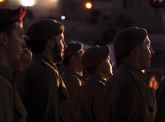×


We have detected your country as:
Please click here to go to the USA website or select another country from the dropdown list.
by: Sagi Melamed
On our way to synagogue Friday evening I asked my son, “So what did you do this week?”
“Drop it Dad. Please! I am exhausted.”
“Guy, I know your military service is physically and mentally arduous. You jump, dive, run and climb. You are constantly being tested and evaluated. You carry heavy physical loads. But don’t forget that your family also carries a load. We’re carrying a heavy emotional load every step of your way, so please understand and include us.”
What was our family load this past year, since Guy has been in the army?
A few injuries and health-related issues. After his first few months in the army, he said, “Dad, I learned that in the army you acquire three things: friends, experiences, and health problems.”
One war in Gaza. Two friends killed in battle. The second time I got hold of him to tell him the bitter news, his first words were, “Who is it this time, Dad?”
Dealing with obsessive thoughts. Sending him positive mental energy from afar during difficult moments. At any moment of the day, guessing what he’s doing and where he is.
 Swearing-in ceremony for new IDF soldiers at the Western Wall At the Western Wall during the swearing-in ceremony, hearing “I swear!” declared in unison by hundreds of young, motivated soldiers. An emotional tear dropping, even from the eyes of supposedly tough fathers.
Swearing-in ceremony for new IDF soldiers at the Western Wall At the Western Wall during the swearing-in ceremony, hearing “I swear!” declared in unison by hundreds of young, motivated soldiers. An emotional tear dropping, even from the eyes of supposedly tough fathers.
An intimate ceremony at the end of the medics’ course. Parents wondering why they play the “Medic’s Ballad” repeatedly, since in the song the heroic medic ends up getting killed.
Chronic exhaustion. Wanting to use every spare moment to nap, but also wanting to enjoy the free time and not “waste all of the Sabbath sleeping, because I can always sleep on the way back to base.”
Going back to his base on Saturday night. Just starting to catch up on sleep and caloric intake, then 36 hours after stepping off the base, returning to the demanding reality of the army.
Occasional Friday morning visits to a base somewhere in the south, when his unit stayed for Shabbat and parental visits were permitted. Traveling four hours to spend one hour with him.
Wanting the keys to Dad’s car, if time permits before Shabbat, to visit his girlfriend. My usual question: “Did you sleep enough to drive safely?” His usual reply: “Dad, the army always insists on that.”
His favorite foods, prepared every Shabbat he gets home. First dibs on the ice-cream.
His little sister’s incomprehension of him getting extra pampering and attention, even after hearing his stories of arduous training. The army is far away but the ice-cream is right here at home.
Sending him kilos of dried fruit, chocolates, cakes and similar: by mail, in his bag, with friends. Anything that can make his life sweeter. Buying supplies: knife, flashlights, batteries, navigation markers, thermal underwear, running shoes, socks…whatever is needed and permitted.
Wondering where he is during the rainiest week of the winter, and whether the army would in fact train in such stormy weather, just to find out at the end of the week: “On the worst day of the storm we practiced swimming in the sea and performing rescues in high waves.”
At the end of his first year of training, during the week which is considered one of the toughest, we were not in Israel and had to send him our positive energies from particularly far away. During Shabbat at my friend Robert’s, Robert asked, “Do Guy and his friends understand the historic, Jewish and Zionist significance of their military service?”
“I believe so. Not all of them. Not all the time. But in general, even if not expressed in words—they understand.”
A week later we were at friends in Boston. Around the table were some American students from elite universities. Our teenage children Eden and Ari were impressed: “Harvard, MIT. Very impressive. And they’re hardly older than Guy.”
“Kids,” I said afterwards, “remember that to a large extent, those nice Jewish boys in Boston have the opportunity to excel and go to the best universities in the US, thanks to the service of your brother and his friends and, in the not too distant future, also thanks to your service.”
Sagi Melamed lives with his family in the community of Hoshaya in the Galilee. He serves as Vice President of External Affairs at the Max Stern Yezreel Valley College. Sagi received his Masters degree from Harvard University in Middle Eastern Studies with a specialty in Conflict Resolution. His book “Son of My Land was published in 2013. Sagi can be contacted at: [email protected]
Photo Credit: Debra Williams/Bridges for Peace
All logos and trademarks in this site are property of their respective owner. All other materials are property of Bridges for Peace. Copyright © 2025.
Website Site Design by J-Town Internet Services Ltd. - Based in Jerusalem and Serving the World.